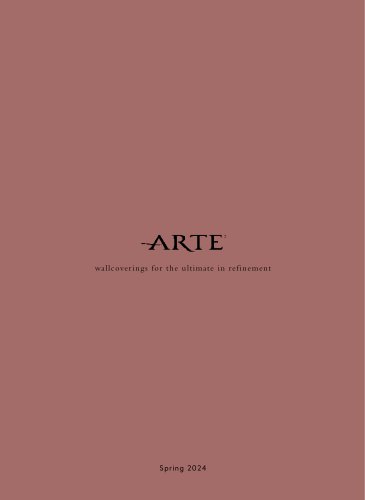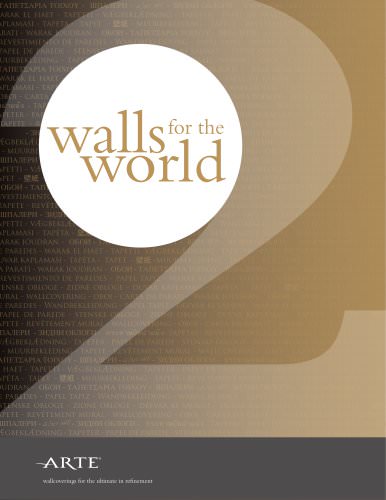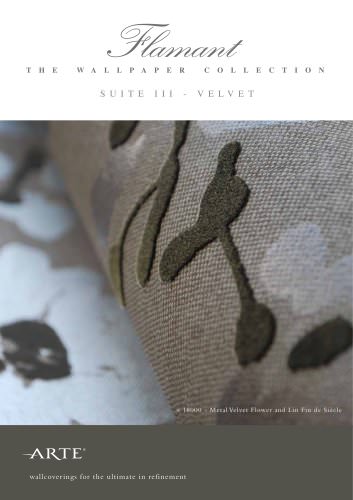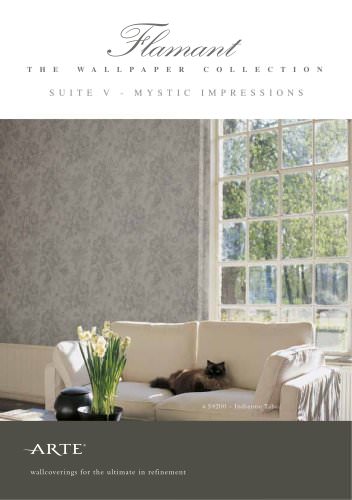
Catalog excerpts

based on Le Corbusier's Polychromie a r c h i t e c t u r a I e
Open the catalog to page 1
wallcover ings for the ultimate in refinement de ultieme verfijning in muurbekleding le revêtement mural dans sa quintessence Wandbekleidung für raffinierte Eleganz www.arte-inter national.com
Open the catalog to page 3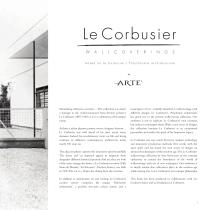
Stimulating, reflective, evocative… This collection is as much a homage to the world-renowned Swiss-French architect, Le Corbusier (1887-1965) as it is a celebration of his unique vision. Architect, urban planner, painter, writer, designer, theorist… Le Corbusier was well ahead of his time across many domains. Indeed, his revolutionary views on life and living continue to influence contemporary architecture today, nearly 100 years on. The adjacent photo captures this innovative spirit beautifully. The house and car depicted appear to originate from altogether different historical periods....
Open the catalog to page 5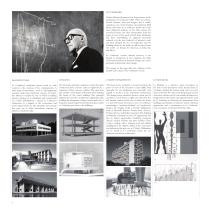
LE CORBUSIER Charles-Édouard Jeanneret-Gris, better known by his pseudonym “Le Corbusier” (1887-1965), was a SwissFrench architect, artist and designer and is widely regarded as one of the founders of modernism. Well ahead of his time, he is without a doubt one of the most influential architects of the 20th century. He conceived homes and their functionality from the point of view of the needs of both their inhabitants and their surroundings, an approach previously unheard of at the time. Indeed, Le Corbusier’s work and ideas changed the face of architecture and the buildings drawn by his...
Open the catalog to page 6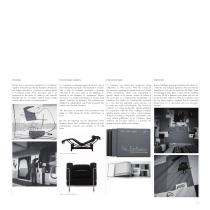
FURNITURE DESIGN Purism was a movement founded by Le Corbusier together with artist and friend, Amédée Ozenfant. It was largely intended as a reaction to cubism, which Le Corbusier found overly decorative, and as an expression of the desire to return to the essential through the use of clearly ordered forms, simple colours and an absence of ornamentation. Le Corbusier’s revitalising approach did not stop at the building but extended to the furniture it contains. This is why Le Corbusier developed a furniture collection in the same spirit as his buildings, he referred to his furniture as...
Open the catalog to page 7
The impressive colours of this collection originate from Le Corbusier‘s unique ‘Polychromie architecturale’ - an inimitable colour system and a masterwork. In view of the numerous natural colours, we decided to make a selection. On the opposite page you can see the colour stripe with all the harmonious Le Corbusier colours and the colours we selected. Each colour has its own specific characteristics and is accompanied by a short description. Le Corbusier‘s ‘polychromie architecturalE’ Les Couleurs Suisse AG holds the worldwide mandate and the exclusive rights from La Fondation Le Corbusier...
Open the catalog to page 8
SNOITANALPxE RUOLOC S’REISUBROC EL si dna eulb peed skool eniramartlu fo ecnaun denekrad sihT ni evisserpmi osla si dna cimanyd skool tI .ytinfini htiw detaicossa .wodahs The profound ultramarin blue. Appears deep blue and reflects infinity. The dynamic shade is fascinating in light and in shadow. ot esolc si taht edahs nworb A .rebmu fo edahs krad ,peed ehT dna elbats skool dnA .tsedom dna ttam skool ruoloc sihT .kcalb na osla si 95 ellerutan erbmO .thgil kaew ro gnorts ni cimanyd dnuorgkcab a sa stca taht edahs a ro ruoloc gnigafluomac laedi .sruoloc rehto gnizisahpme The deeply dark...
Open the catalog to page 9
PAVILION Le Corbusier is most renowned for his purist, modernist architecture. And yet, the strict, minimalist forms associated with the movement were far from sacred for him. In his artworks, for example, we find a range of more organic forms and warm colours. Moreover, we know that this more organic approach also began to show in his architecture from the 1950s, most likely inspired by Le Corbusier’s many travels. An example of this “warmer” and more organic approach can be found in his chapel Notre Dame du Haut in Ronchamp. Chapel Notre Dame du Haut in Ronchamp. Built in 1954, this...
Open the catalog to page 12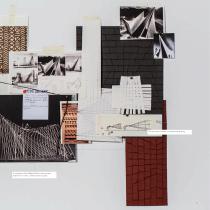
The decorative element of architectural drawing. 11/7 A wireframe of the Philips Pavilion’s tent structure inspired us to create a similar pattern in paper.
Open the catalog to page 13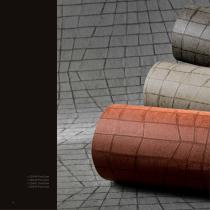
Pavilion Pavilion Pavilion Pavilion
Open the catalog to page 16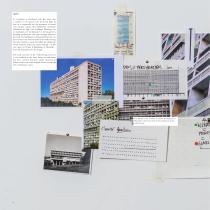
UNITY Le Corbusier is attributed with the claim that a window is not meant to let in air but light. In fact, he is responsible for the invention of several new window systems that enabled the maximum infiltration of light into buildings. Windows, for Le Corbusier, are “perforations” in the façade of a building, perforations that also strongly influence the look of a building. It is this perforation that we have raised to the level of motif in this wallcovering. Not the window as such but rather the rhythm in which windows define the exterior façade – in this case those of l’Unité...
Open the catalog to page 18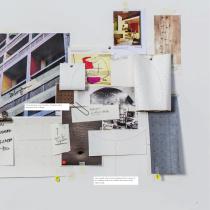
The perforated wood which Le Corbusier often integrated in his collages. The warmth of his purist paintings and the texture of his workshop define the tonality and texture of the wallcovering.
Open the catalog to page 19
20503 Unity 20502 Unity # 20500 Unity # #
Open the catalog to page 21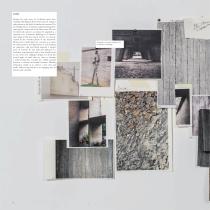
STONE During his early years, Le Corbusier spent time working with Auguste Perret. Perret was an architect and pioneer in the field of reinforced concrete. The knowledge that Le Corbusier acquired during those years played a major role in his later career. The use of reinforced concrete can almost be regarded as a constant in Le Corbusier’s buildings. Le Corbusier often played with the typical texture of concrete, created by the wooden planks of the formwork. However, he would often use concrete as a canvas for other patterns and illustrations as well, lending an otherwise cold and bleak...
Open the catalog to page 24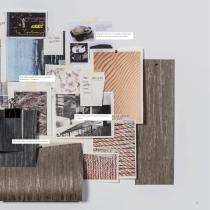
Wooden table from Le Corbusier. Illustrating his love for natural materials and textures. The replica marble structure as supplied to Salubra by Le Corbusier. Photomural of natural materials made by Le Corbusier. First tests with a simulated concrete structure.
Open the catalog to page 25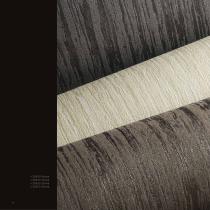
Stone Stone Stone Stone
Open the catalog to page 28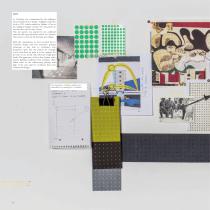
DOTS Le Corbusier was commissioned by the wallpaper factory Salubra S.A. to design a wallpaper collection back in 1931, which resulted in Salubra I. One of the wallpaper designs consisted of a dot pattern in two dot sizes, each in nine colours. This dot pattern was inspired by the cardboard material with tiny perforations which Le Corbusier often used as a base for his drawings and collages. With this composition, we have recreated the Le Corbusier design with new innovative printing techniques in line with Le Corbusier’s own progressive spirit. The dot pattern, for example, is not made...
Open the catalog to page 30All ARTE catalogs and technical brochures
-
DESERT DREAMS SPRING 2023
23 Pages
-
BABYLON
17 Pages
-
All wallcoverings | February 2024
544 Pages
-
Catalogue
465 Pages
-
SAMAL PRISMA
1 Pages
-
SAMAL CUBIC
1 Pages
-
MANILA TULLE
1 Pages
-
MANILA FLORE
2 Pages
-
MANILA BOTANIC
2 Pages
-
Essentials | Les Nuances
2 Pages
-
Wildwalk
2 Pages
-
Velveteen
2 Pages
-
Expedition
2 Pages
-
Signature
2 Pages
-
Ligna
2 Pages
-
Spectra
2 Pages
-
Revera
2 Pages
-
Vertigo
2 Pages
-
Sienna
2 Pages
-
Belgian Linen & Sapphire
2 Pages
-
Aurora
2 Pages
-
Arctic Shades
2 Pages
-
VERDE
2 Pages
-
Oculaire
2 Pages
-
Booklet Spring 2017
52 Pages
-
Photo Cubic Spring
204 Pages
-
Alchemy
2 Pages
-
Monochrome
2 Pages
-
walls for the world 2014
508 Pages
-
Photo Cubic 2016
188 Pages
-
Booklet Spring 2016
56 Pages
-
Flamant
48 Pages
-
Memento
2 Pages
-
Monsoon
2 Pages
-
Manakin
2 Pages
-
Flamant Les Minéraux
2 Pages
-
booklet spiring
56 Pages
-
compagny brochure
28 Pages
-
Noctis Oxide
24 Pages
-
Heliodor Mariano
24 Pages
-
wallcoverings
28 Pages
Archived catalogs
-
walls for the world 2013
392 Pages
-
collection Carapace
2 Pages
-
collectionOsiris
2 Pages
-
Collection METALLICS
2 Pages
-
Collection Metal X
2 Pages
-
collection Camouflage
2 Pages
-
collection Bark Cloth
2 Pages
-
collection Antelope
2 Pages
-
collection Saga II
2 Pages
-
collectionWild
2 Pages
-
collection Zeppelin
2 Pages
-
collectionMasquerade
2 Pages
-
collectionMarrakech
2 Pages
-
Flamant suite IV
2 Pages
-
collection Cosmopolitan
2 Pages
-
collection Penelope Odyssey
2 Pages
-
collectionOxide
2 Pages
-
collectionNoctis
2 Pages





